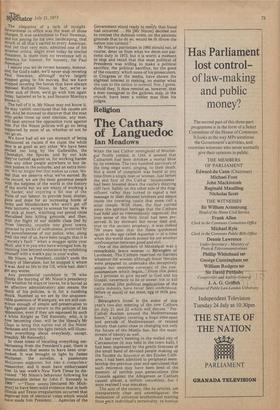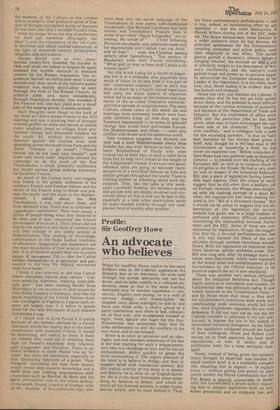Religion
The Cathars of Languedoc
Ian Meadows
When the last Cathar stronghold of Montsegur finally yielded, in 1244, it seemed that Catharism had been stricken a mortal blow by its enemies. The two hundred survivors of the long siege went, singing, to their death. Not a word of complaint was heard at any time from a single man or woman. Just before the end four of the Cathar bonshommes ' had been lowered down the castle's dizzying cliff-face. Safely on the other side of the magnificent valley they turned to signal a last message to their doomed brothers and sisters inside the towering castle that some call a solar temple. With them, the four carried away the spiritual heritage that the Cathars had held and so tremendously improved; the true sense of the Holy Grail had been preserved. It lay dormant but never died and, true to the ancient prophecy, it was indeed 700 years later that the flame quickened again in the age called Aquarius — at a time when the world stands poised for yet another confrontation between good and evil.
One of the defenders of Montsegur was a remarkable, brave woman — Berangere of Lavelanet. The Cathars reserved no barriers whatever for women although fewer females were prepared to undertake the deceptively simple but awesome covenant of the consolamentum which began, "From this point on I promise to give myself to God and his Gospel, nevermore to lie or swear; not to kill any animal [the political implications of the cattle industry have never been understood, before or since] or eat meat, egg or milk produce ..."
Berangere's homeis the scene of this year's two-day meeting of the new Cathars on July 21 and 22 which will discuss " PreCathar dualism around the Mediterranean basin," a subject covering a huge time-span and periods of Mediterranean or related history that came close to changing not only the future of the Middle Sea, but the mainstream of history as well. At last year's meeting in the walled city of Carcassonne (it was held in the town hall), I had been impressed by the gentle firmness of the small band of devoted people making up the Societe du Souvenir et des Etudes Cathares. I had been admitted to peripheral mem bership the previous year and speculated that such reticence may have been bred of the memory of terrible past persecutions (the Crusade against the Albigenses or Cathars caused almost a million casualties), but I
soon realised I was mistaken.
The acts of the society, like its articles, are transparently clear and unambiguous: the
realisation of universal brotherhood starting from zach individual's personality, to honour
the memory of the Cathars in this context and to exemplify their profound sense of free dom of thought and perfect purity of manners (it was here also that 1 recalled Pound's lines, " come my songs, let us not sing of perfection, we shall get ourselves thoroughly disliked ") and the resurgence of the old Cathar doctrines and ideals studied extensively in the light of twentieth-century philosophies, religions, arts and science.
Deodat Roche, now an alert, determinded ninety-five, founded the Societe in 1948 and when we talked in Arques he again stressed the terrible obstacle to research created by the Roman Inquisition The Inquisitors burned or confiscated most Cathar records and, thus, much of the hitherto public evidence was mainly anti-Cathar as seen through the eyes of the Roman Church, its political allies, and, more immediately, through Inquisition records. One wonders if the Vatican will, one day, yield even a small part of the missing pieces. It seems unlikely.
Such thoughts were thrust to the back of my mind as I drove across France to the 1972
meeting and saw a growing rash of strongly worded graffiti on walls and fences of almost every southern town or village. Each pro claimed change and demanded freedom for the south. All, without exception, were directed against the tourists even then spreading across the south from Paris and the
north: " Parisian — go home!"; " French. tourist, we do not need your money!"; and
some very much ruder. Inquiries showed the campaign to be the work of the Red Troubadours, a small, presently inoffensive but deadly serious group seeking autonomy for Southern France.
As much of the Cathar story and tragedy was linked to the greedy ambitions of the northern French and German barons and the desire of the French king to break and possess the south, and the route to the Mediter
ranean, I asked about the Red
Troubadours. I was told about them, and their declared aims. There was no criticism or superfluous explanation. They were simply a group of people doing what they believed to be best and if that concerned the French government then so be it. The Cathars did not and do not believe in any form of violence nor will they indulge in any public protest or demonstration. The sharing of knowledge, continuation of the finest human tradition, re-education, reappraisal and meditation are the main boundaries of their eclectic philosophy. It is all done so quietly that one is scarce aware of movement. Yet — like the Cathar valleys themselves—it is pervasive and per-, suasive in the way the original movement must have been!
I think it also relevant to add that Cathar elders dismissed reports that certain 'German-speaking elements, wearing semi-mili tary gear " had been stealing blocks from Montsegur to use as corner or altar stones for their Black Temples in Germany. Alas like the black-magicking of the United Nations Austrian contingent at Paphos in Cyprus such reports are largely true. It is better to ignore them for the very discussion of such matters constitutes a trap.
If I return now to Ezra Pound it is partly because of the interest aroused by a recent Spectator article but mainly due to the poet's connections with southern France. It would be interesting, and useful, to know if there are readers who could aid in shedding more light on Pound's extremely deep relations with Languedoc and Provence. There is no direct evidence to show Pound was an 'in itiate ' but there are references, especially in that fascinating labyrinth of a poem ' Near Perigord ' (including the lines from Dante) which reveal deep esoteric knowledge and a more than just nodding acquaintance with characters such as Bertran de Born and his agent provocateur role in the whole destiny of the south. Pound, a native of Scorpio, with all the ' dualism ' of that particular sign, also went deep into the secret language of the Troubadours (it now seems well-established incidentally that Richard Lionheart was both initiate and Troubadour). Pound's lines in terms of so-called ' Pagan Languedoc ' are revealing. He writes of " . . Christ following Dionysus,the phallic and ambrosial made way for macerations and Caliban cast out Ariel," and of how •' even the Christian beauty defects after Samothrace." This section of Mauberiey ends with Pound exclaiming, "What god, or man or hero shall I place a tin wreath upon?"
No, this is not a plug for a return to paganism but is is a reminder that paganism held much of value. In its best form it was part of the continuous tradition ' and as such was done to death by a Church turned rapacious, and using the worst aspects of paganism which led to so many of the horrors and massacres of the so-called 'formative centuries ' and other periods of enlightenment. The early Cathars, whose views on life, death, sin and marriage were extremely modern were basically sufferers when all that they and the Templars represented — in terms of splendid change that would have galvanised Europe, the Mediterranean and Islam — came into conflict with Rome and the ambitious north.
New evidence suggests that Richard not only had a draft Mediterranean treaty from Saladin but also with lkhwan as Safa, the Islamic Brotherhood of Purity who were tricked out of their plan to send a relief force from Fez to help the Cathars at the height of the Albigensian Crusade. Even now very quiet, informal talks are going on between representatives of a revivified Ikhwan as Safa and similar groups throughout the world. There is nothing sinister or scheming about such discussions. They, like the talks at this weekend's Lavelanet meeting, are between people and groups who are deeply involved and concerned about all that is and can be best in life, especially at a time when materialism sends its many-headed tendrils through one complacent level of society after another.































 Previous page
Previous page